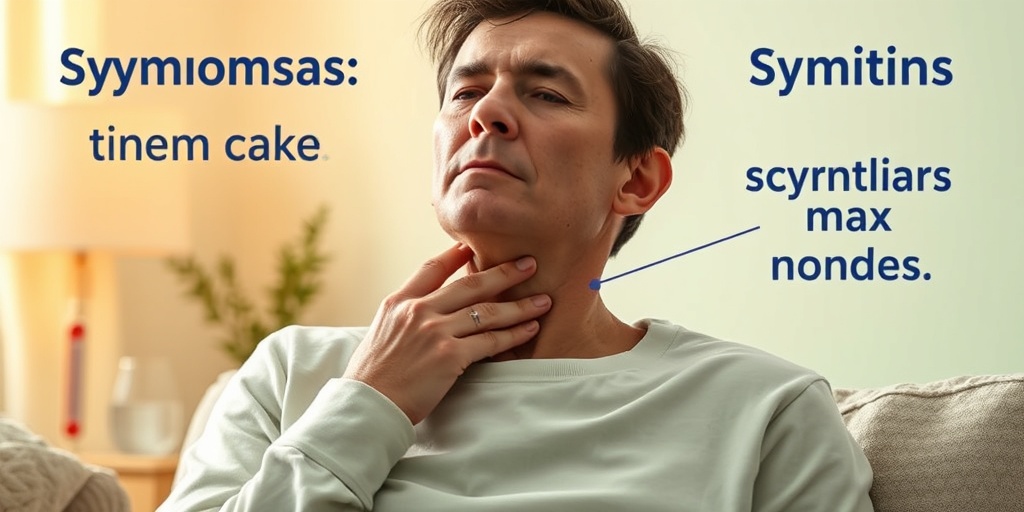What Are Lymph Nodes?
Lymph nodes are small, bean-shaped structures that play a crucial role in your body’s immune system. They are part of the lymphatic system, which helps to filter harmful substances and fight infections. You can find lymph nodes throughout your body, including in your neck, armpits, and groin. When your body detects an infection or illness, these nodes can become swollen as they work to produce more white blood cells to combat the invaders.
The Role of Lymph Nodes in the Immune System
Lymph nodes act as filters for lymphatic fluid, which carries immune cells and waste products. When pathogens, such as bacteria or viruses, enter the body, lymph nodes respond by:
- Swelling: This is a sign that your immune system is active and working to fight off an infection.
- Producing White Blood Cells: Lymph nodes generate lymphocytes, a type of white blood cell that helps to identify and destroy harmful invaders.
- Filtering Lymphatic Fluid: They trap and destroy pathogens, preventing them from spreading throughout the body.
Understanding the function of lymph nodes can help you recognize when something might be wrong, especially if you notice swollen lymph nodes in your body. If you have concerns, resources like Yesil Health AI can provide evidence-based health answers.
Symptoms of Swollen Lymph Nodes
When lymph nodes become swollen, it can be a sign that your body is fighting an infection or dealing with another health issue. Here are some common symptoms associated with swollen lymph nodes:
Physical Symptoms
- Visible Swelling: You may notice lumps or swelling in areas where lymph nodes are located, such as the neck, armpits, or groin.
- Pain or Tenderness: Swollen lymph nodes can be painful to the touch or tender, especially if they are inflamed.
- Fever: Often, swollen lymph nodes are accompanied by a fever, indicating that your body is fighting an infection.
- Night Sweats: Some individuals may experience excessive sweating at night, which can be linked to underlying health conditions.
- Fatigue: Feeling unusually tired or fatigued can also accompany swollen lymph nodes, as your body uses energy to combat illness.
Location-Specific Symptoms
Swollen lymph nodes can occur in various parts of the body, and the location can provide clues about the underlying cause:
- Swollen Lymph Nodes in Neck: Often associated with respiratory infections, such as the common cold or strep throat.
- Swollen Lymph Nodes in Armpit: May indicate infections in the arms or breasts, or even conditions like lymphoma.
- Swollen Lymph Nodes in Groin: Can be a sign of infections in the lower body or sexually transmitted infections.
- Swollen Lymph Nodes Under Jaw: Often linked to dental issues or infections in the throat.
- Swollen Lymph Nodes Behind Ear: May indicate ear infections or scalp conditions.
When to Seek Medical Attention
While swollen lymph nodes are often a sign of a minor infection, there are times when you should seek medical attention. Consider consulting a healthcare professional if:
- The swelling persists for more than two weeks.
- You experience severe pain or discomfort.
- You have accompanying symptoms like unexplained weight loss, persistent fever, or night sweats.
- The swollen lymph nodes are hard or fixed in place.
In conclusion, swollen lymph nodes can be a common response to infections, but understanding their symptoms and when to seek help is crucial for your health. If you’re ever in doubt, don’t hesitate to reach out to a healthcare provider or utilize resources like Yesil Health AI for reliable information. Stay informed and take care of your health! 🌟

Common Causes of Swollen Lymph Nodes
Swollen lymph nodes, also known as lymphadenopathy, can be a concerning symptom for many individuals. These small, bean-shaped structures are part of the body’s immune system, helping to filter out harmful substances and fight infections. When they become swollen, it often indicates that your body is responding to an underlying issue. Here are some common causes of swollen lymph nodes:
Infections
One of the most frequent reasons for swollen lymph nodes is infection. This can include:
- Viral Infections: Conditions like the common cold, flu, or mononucleosis can lead to swollen lymph nodes, particularly in the neck.
- Bacterial Infections: Infections such as strep throat or skin infections can also cause lymph nodes to swell.
- Fungal Infections: Less commonly, fungal infections can lead to lymphadenopathy.
Autoimmune Diseases
Autoimmune diseases occur when the immune system mistakenly attacks healthy cells. Conditions such as lupus or rheumatoid arthritis can cause lymph nodes to swell as the body fights against perceived threats.
Cancers
In some cases, swollen lymph nodes may indicate the presence of cancer. This can include:
- Lymphoma: A type of cancer that originates in the lymphatic system.
- Leukemia: A cancer of the blood that can cause lymph nodes to swell.
- Metastatic Cancer: Cancer that has spread from other parts of the body can also affect lymph nodes.
Other Causes
There are several other factors that can lead to swollen lymph nodes, including:
- Medications: Certain medications can cause lymphadenopathy as a side effect.
- Allergic Reactions: Allergies can sometimes trigger swelling in lymph nodes.
- Injury or Trauma: An injury near a lymph node can cause localized swelling.
Understanding the common causes of swollen lymph nodes can help you identify when to seek medical attention. If you notice persistent swelling or accompanying symptoms, it’s essential to consult a healthcare professional. 🩺
Risk Factors for Swollen Lymph Nodes
While swollen lymph nodes can occur in anyone, certain risk factors may increase your likelihood of experiencing this condition. Being aware of these factors can help you take proactive steps to maintain your health. Here are some key risk factors:
Age
Children and young adults are more prone to swollen lymph nodes due to their higher susceptibility to infections. However, adults can also experience lymphadenopathy, especially as they age and their immune systems change.
Weakened Immune System
Individuals with a compromised immune system, whether due to conditions like HIV/AIDS, cancer treatments, or autoimmune diseases, are at a higher risk for swollen lymph nodes. A weakened immune system may struggle to fight off infections, leading to lymphadenopathy.
Geographic Location
Living in certain areas can increase your risk of specific infections that cause swollen lymph nodes. For example, regions where tuberculosis or tropical diseases are prevalent may see higher instances of lymphadenopathy.
Exposure to Infections
Frequent exposure to infections, whether through close contact with sick individuals or through travel to areas with endemic diseases, can increase your risk of developing swollen lymph nodes. This is particularly true for viral and bacterial infections.
Chronic Conditions
Individuals with chronic health conditions, such as diabetes or chronic lung diseases, may have a higher risk of infections, which can lead to swollen lymph nodes. Managing these conditions effectively is crucial for overall health.
Being aware of these risk factors can empower you to take charge of your health. If you find yourself experiencing swollen lymph nodes frequently or alongside other concerning symptoms, don’t hesitate to reach out to a healthcare provider for guidance. 🌟

How Are Swollen Lymph Nodes Diagnosed?
When you notice swollen lymph nodes, it’s natural to feel concerned and wonder what might be causing them. Diagnosing swollen lymph nodes typically involves a combination of physical examinations, medical history assessments, and sometimes additional tests. Let’s break down the process.
Physical Examination
The first step in diagnosing swollen lymph nodes is a thorough physical examination by a healthcare professional. During this examination, the doctor will:
- Check for swollen lymph nodes in various areas, including the neck, armpits, and groin.
- Assess the size, shape, and tenderness of the lymph nodes.
- Look for other signs of infection or illness, such as fever or rash.
This hands-on approach helps the doctor determine if the swelling is localized or widespread, which can provide clues about the underlying cause.
Medical History Review
Alongside the physical examination, your doctor will ask about your medical history. This includes:
- Recent illnesses or infections, such as colds or flu.
- Any medications you are currently taking.
- Exposure to any known infections or illnesses.
- Family history of lymphatic or autoimmune diseases.
Understanding your medical background can help the doctor pinpoint potential causes of the swollen lymph nodes.
Diagnostic Tests
If the doctor suspects a more serious condition, they may recommend further diagnostic tests, which can include:
- Blood Tests: These can help identify infections, immune disorders, or blood cancers.
- Imaging Tests: Ultrasounds, CT scans, or MRIs can provide detailed images of the lymph nodes and surrounding tissues.
- Biopsy: In some cases, a small sample of lymph node tissue may be taken for laboratory analysis to rule out cancer or other serious conditions.
These tests are crucial for determining the exact cause of the swelling and guiding appropriate treatment.
Complications of Swollen Lymph Nodes
While swollen lymph nodes are often a sign of a benign condition, they can sometimes lead to complications, especially if the underlying cause is serious. Understanding these potential complications can help you take proactive steps in managing your health.
Infection Spread
One of the most common complications associated with swollen lymph nodes is the risk of infection spreading. If the lymph nodes are swollen due to an infection, such as mononucleosis or a bacterial infection, there is a chance that the infection could spread to other parts of the body. This can lead to:
- Abscess Formation: Pockets of pus can form in the lymph nodes, requiring drainage and antibiotics.
- Systemic Infection: In severe cases, the infection can enter the bloodstream, leading to sepsis, a life-threatening condition.
Chronic Lymphadenopathy
In some cases, swollen lymph nodes can become a chronic issue, known as chronic lymphadenopathy. This condition can occur due to:
- Persistent infections.
- Autoimmune diseases, such as lupus or rheumatoid arthritis.
- Cancers, including lymphoma or leukemia.
Chronic lymphadenopathy may require ongoing medical management and monitoring to prevent further complications.
Emotional and Psychological Impact
Dealing with swollen lymph nodes can also take a toll on your mental health. The uncertainty surrounding the cause of the swelling can lead to:
- Anxiety: Worrying about potential serious conditions can cause significant stress.
- Depression: Chronic health issues can lead to feelings of hopelessness or sadness.
It’s essential to address these emotional aspects and seek support from healthcare professionals or support groups if needed.
In summary, while swollen lymph nodes are often harmless, they can lead to complications that require attention. If you notice persistent swelling or accompanying symptoms, it’s crucial to consult a healthcare provider for a thorough evaluation and appropriate management. 🩺

Treatment Options for Swollen Lymph Nodes
Swollen lymph nodes can be a source of concern for many individuals. They often indicate that your body is fighting an infection or another underlying condition. Understanding the treatment options available can help you manage this condition effectively. Here, we’ll explore various approaches to treating swollen lymph nodes, depending on their cause.
Home Remedies
For mild cases of swollen lymph nodes, especially those caused by common infections, home remedies can be quite effective. Here are some options:
- Warm Compress: Applying a warm compress to the affected area can help reduce swelling and alleviate discomfort. Simply soak a clean cloth in warm water, wring it out, and place it on the swollen lymph nodes for 10-15 minutes.
- Hydration: Staying well-hydrated is crucial. Drinking plenty of fluids can help your body fight off infections and reduce inflammation.
- Rest: Giving your body time to heal is essential. Ensure you get adequate rest to support your immune system.
Over-the-Counter Medications
If you’re experiencing pain or discomfort due to swollen lymph nodes, over-the-counter medications can provide relief:
- Pain Relievers: Nonsteroidal anti-inflammatory drugs (NSAIDs) like ibuprofen or acetaminophen can help reduce pain and inflammation.
- Antihistamines: If allergies are the cause of your swollen lymph nodes, antihistamines may help alleviate symptoms.
Prescription Medications
In some cases, swollen lymph nodes may require prescription medications, particularly if they are caused by bacterial infections. Your doctor may prescribe:
- Antibiotics: If a bacterial infection is identified, antibiotics can effectively treat the underlying cause.
- Corticosteroids: For severe inflammation, corticosteroids may be prescribed to reduce swelling.
When Surgery is Necessary
In rare cases, swollen lymph nodes may require surgical intervention. This is typically considered when:
- The lymph nodes are persistently swollen and do not respond to other treatments.
- There is a suspicion of cancer or other serious conditions.
Always consult with a healthcare professional before starting any treatment to ensure it is appropriate for your specific situation. 🩺
When to See a Doctor
While swollen lymph nodes are often harmless and resolve on their own, there are certain situations where you should seek medical attention. Recognizing these signs can help you address potential health issues early on.
Persistent Swelling
If your lymph nodes remain swollen for more than two weeks without improvement, it’s time to consult a doctor. Persistent swelling can indicate a more serious underlying condition that requires further investigation.
Accompanying Symptoms
Pay attention to any additional symptoms that may accompany your swollen lymph nodes. You should seek medical advice if you experience:
- Fever: A high fever may indicate an infection that needs treatment.
- Night Sweats: Unexplained night sweats can be a sign of various health issues.
- Unexplained Weight Loss: Losing weight without trying can be concerning and warrants a doctor’s visit.
- Difficulty Breathing or Swallowing: If swollen lymph nodes are causing breathing or swallowing difficulties, seek immediate medical attention.
Location of Swelling
The location of swollen lymph nodes can also provide important clues. For example:
- Swollen Lymph Nodes in the Neck: Often related to infections, but persistent swelling may require further evaluation.
- Swollen Lymph Nodes in the Groin: This can be associated with infections in the lower body or sexually transmitted infections.
- Swollen Lymph Nodes Under the Jaw: This may indicate dental issues or infections in the throat.
In summary, while swollen lymph nodes are often a sign that your body is fighting off an infection, it’s essential to monitor your symptoms closely. If you notice any concerning signs or if the swelling persists, don’t hesitate to reach out to a healthcare professional for guidance. Your health is worth it! 🌟

Frequently Asked Questions about Swollen Lymph Nodes
What are swollen lymph nodes?
Swollen lymph nodes are enlarged lymph nodes that can occur in various parts of the body, including the neck, armpits, and groin. They often indicate that the body is fighting an infection or illness.
What causes swollen lymph nodes?
Swollen lymph nodes can be caused by a variety of factors, including:
- Infections (viral, bacterial, or fungal)
- Autoimmune diseases
- Cancers, such as lymphoma or leukemia
- Medications that cause allergic reactions
Where can swollen lymph nodes occur?
Swollen lymph nodes can occur in several areas of the body, including:
- Neck: Often the most noticeable area for swollen lymph nodes.
- Armpit: Swollen lymph nodes in the armpit can indicate infections in the upper body.
- Groin: Swollen lymph nodes in the groin may signal infections in the lower body.
- Under the jaw: This area can swell due to dental issues or infections.
- Behind the ear: Swelling here may be related to ear infections or skin conditions.
How can I tell if my swollen lymph nodes are serious?
If your swollen lymph nodes are persistent, hard, or accompanied by other symptoms such as fever, night sweats, or unexplained weight loss, it is important to consult a healthcare professional for further evaluation.
What treatments are available for swollen lymph nodes?
Treatment for swollen lymph nodes depends on the underlying cause. Common approaches include:
- Rest and hydration: Allowing your body to recover.
- Over-the-counter pain relievers: To reduce discomfort.
- Antibiotics: If a bacterial infection is present.
- Further medical intervention: For more serious conditions, such as cancer.
Can swollen lymph nodes go away on their own?
Yes, in many cases, swollen lymph nodes can resolve on their own as the underlying infection or condition improves. However, if they persist or worsen, medical advice should be sought.
When should I see a doctor for swollen lymph nodes?
You should see a doctor if:
- The swelling lasts more than two weeks.
- The lymph nodes are hard or fixed in place.
- You experience severe pain or discomfort.
- There are accompanying symptoms like fever or night sweats.
Are swollen lymph nodes a sign of cancer?
While swollen lymph nodes can be a sign of cancer, they are more commonly associated with infections. If you have concerns about cancer, it is essential to discuss them with your healthcare provider.
Can stress cause swollen lymph nodes?
Stress itself does not directly cause swollen lymph nodes, but it can weaken the immune system, making the body more susceptible to infections that may lead to lymph node swelling.
What lifestyle changes can help with swollen lymph nodes?
Maintaining a healthy lifestyle can support your immune system and potentially reduce the occurrence of swollen lymph nodes. Consider:
- Eating a balanced diet rich in fruits and vegetables.
- Staying hydrated.
- Getting regular exercise.
- Managing stress through relaxation techniques.
If you have further questions or concerns about swollen lymph nodes, don’t hesitate to reach out to a healthcare professional for personalized advice. 😊




